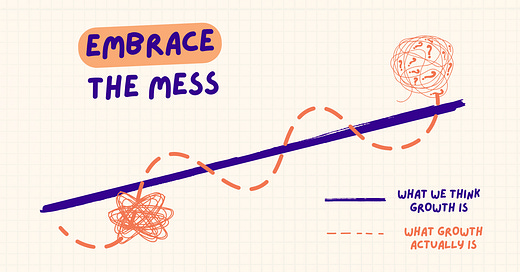Embrace the Mess: Why Perfection is the Enemy of Progress
It's easy to fall into the trap that you "should" have a perfect plan and elegant OKRs. Real examples from Netflix and Codecademy show reality is far messier.
Did you know Netflix was still shipping DVDs until 2023? One of the biggest mistakes I see startup leaders make: letting perfect be the enemy of the good. Forget perfection—embrace the mess.
Story time:
When it comes to building a successful startup, it’s easy to fall into the “should” trap of thinking that - all the things you “should” be doing. All the plans you “should” be executing flawlessly on.
So let’s examine two stories —one from Netflix and another from Codecademy—that show why it’s better to embracing imperfection.
The Netflix Qwikster Debacle: A Lesson in Navigating Imperfection
❌ Conventional wisdom: Perfect your strategy and then pursue it ruthlessly.
🌱 Reality: You can’t be so narrow-minded — you might need to support multiple strategies for a decade longer than you thought.
In 2011, Netflix wanted to split-off their DVD business into a separate “Qwikster” service so they could focus on the future: streaming.
It made strategic sense and would help them internally and operationally, but customers revolted.
They lost subscribers and their stock price declined by 50%.
Quickly scrapping the idea of Qwikster, Netflix reversed course publicly. But internally stayed focused on streaming.
CEO Reed Hastings admitted:
“Sometimes, the thing that makes you great, your speed, can trip you up… we need to be more thoughtful as we move.”
Long-term the shift to streaming was correct, but the market in 2011 simply wasn’t ready.
They had to live with the mess and keep supporting the DVD business for another 12 years before finally sunsetting it in 2023.
Overplanning at Codecademy: Why Momentum Beats Perfection
❌ Conventional wisdom: Run quarterly and annual planning processes. Create cascading OKRs that ladder-up elegantly from team goals to department goals to company goals.
🌱 Reality: Annual plans are too long - things change too fast in a startup. And it can easily take weeks to perfect those cascading OKRs: time you’re not spending shipping. Meanwhile quarters are too short to truly ideate, adjust teams, and still make substantive progress.
At Codecademy, I remember spending 3 feverish weeks on annual planning.
We built company level OKRs that cascaded down to teams. Every department spent time horse-trading to get each other’s dependencies added to each others OKRs.
When we finally rolled-out the cross-functional teams that would pursue each big objective, we were already into February.
OKR best practices say leadership should define the “desired outcome” and let teams figure out “how we get there.”
That means each cross-functional team now needed to run their own planning process to ideate, gather context and data on their area, and talk to customers, and write a roadmap for how they get there.
By the time they started picking up momentum actually shipping, it was the end of March. And we started rejiggering OKRs and adjusting teams all over again.
No bueno. 🙅♂️ 🌮
Too much planning can kill momentum.
Instead of such a rigorous process, be okay with some mess.
Write six month plans instead of annual plans. Long enough for teams to build momentum but short enough to adapt.
Keep teams stable for at least six months so they can build-up context and pick up momentum, even if it’s sub-optimal. As a leader this might feel like you did a slap shod job, but people are resilient and it’s better to be moving than at a stand-still waiting for the plan to be perfect.
"You can’t steer a parked car." Taking action and making adjustments along the way beats being perfectly-aligned before moving.
The Power of Imperfect Action: Keep Moving Forward
Both Netflix and Codecademy learned that the some motion beats perfect direction.
In a startup, flexibility and momentum are your greatest assets.






Prasid,
I love this post (especially point #2). I was running my own startup growth agency for 5 years and the common consensus was that for each client, you should set quarterly goals and then do a quarterly check-in assess how you stacked up.
For our team of 10 full-time people and ~ 40 clients, trying to set quarterly goals proved exceptionally time consuming and tedious. I found the whole process often took 2-3 weeks and really took us away from the work that actually mattered: optimizing / improving our campaign strategies. I eventually ditched the quarterly goal setting process, but felt guilty doing so. I appreciate you sharing how others have come to a similar conclusion.
-James